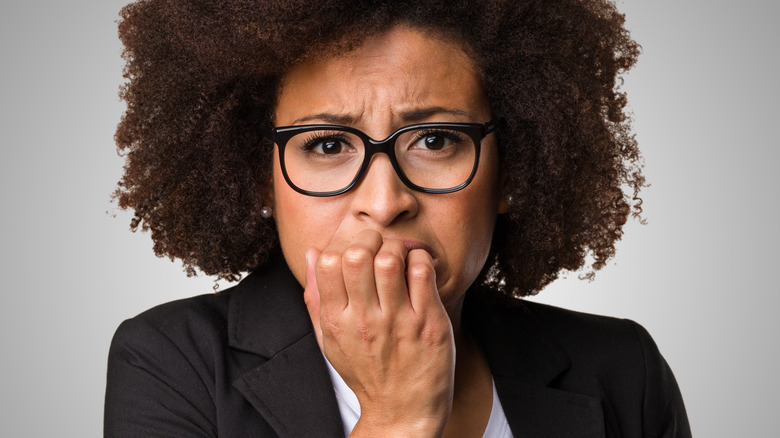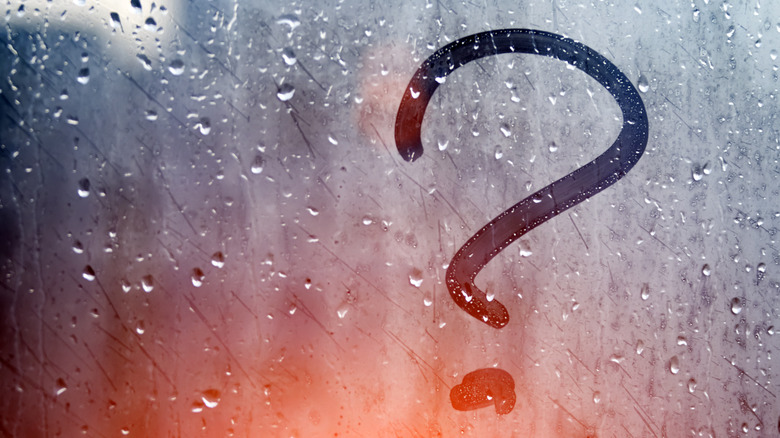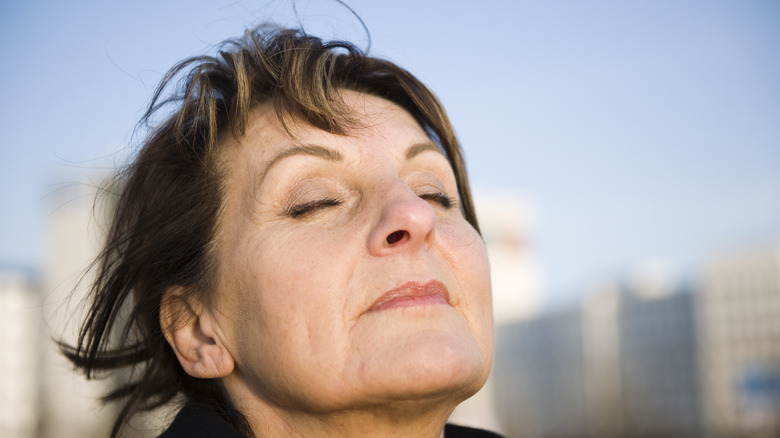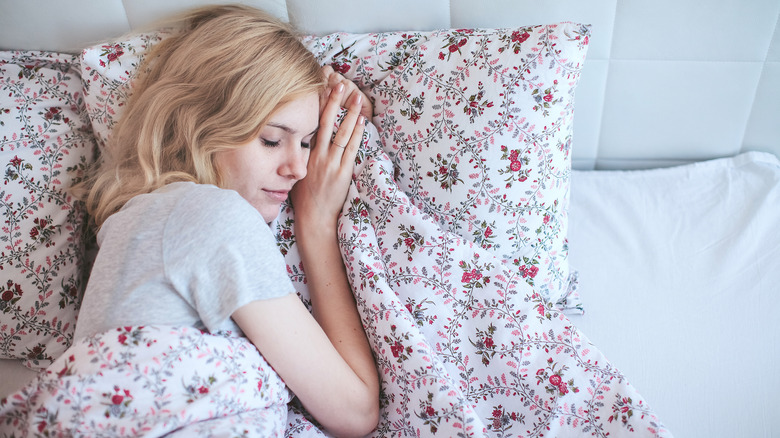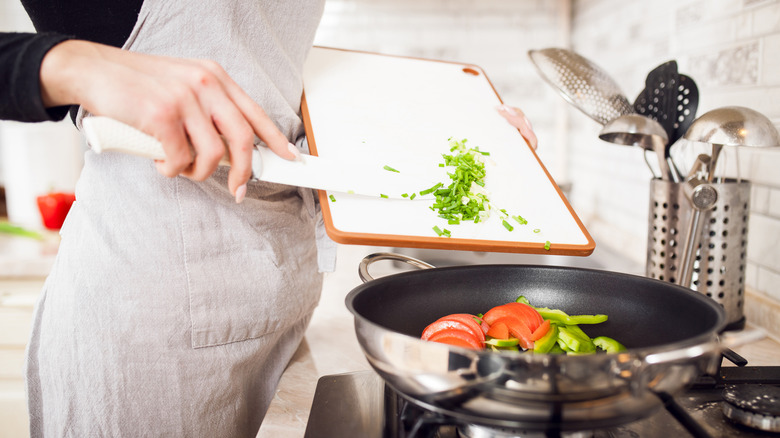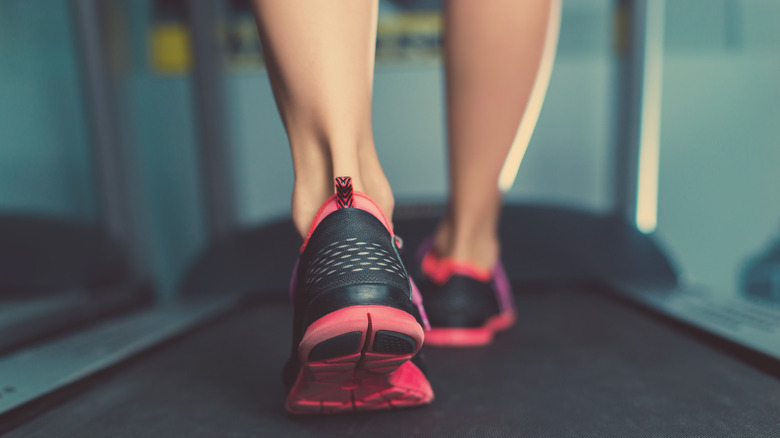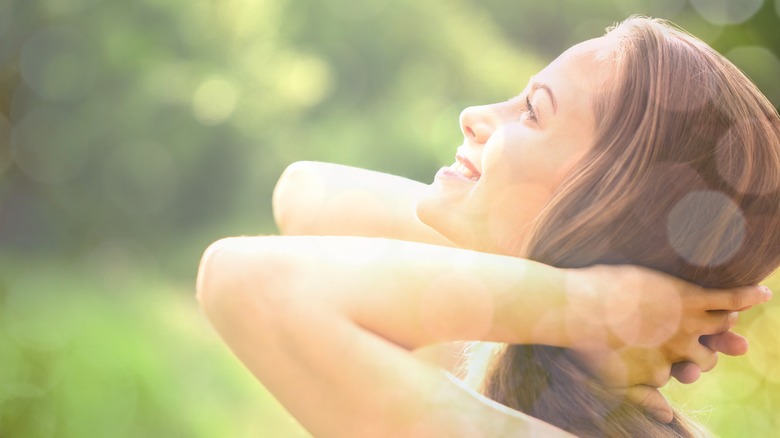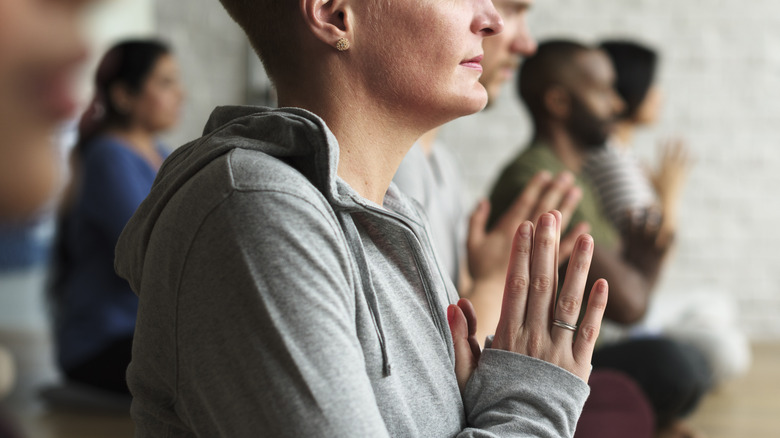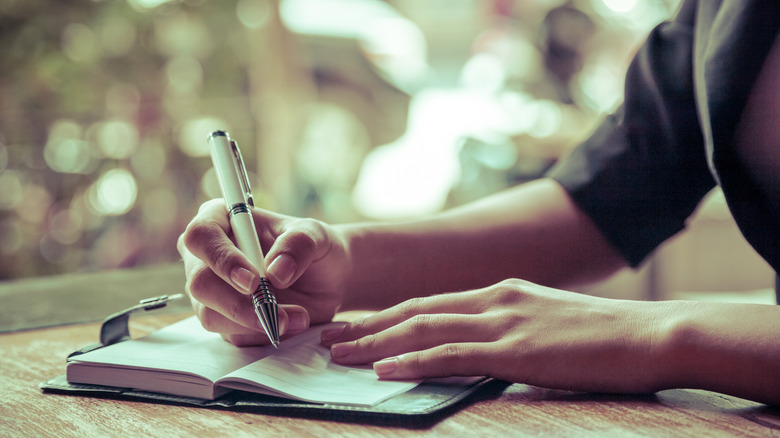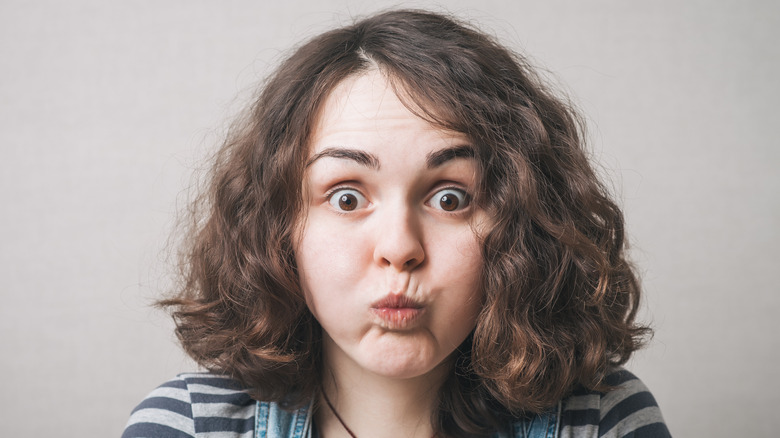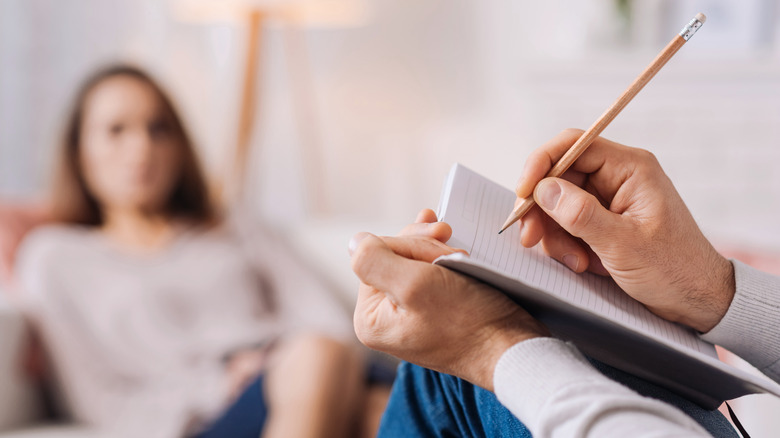Ways To Help Yourself Feel Less Anxious
Did you know anxiety disorders are the most common mental illness in America, affecting roughly 18 percent of the U.S. population? In addition, women are 60 percent more likely than men to experience an anxiety disorder, according to the National Institute of Mental Health.
Even if you don't experience an anxiety disorder in the strictest sense, it's important to know anxiety is a natural reaction to everyday stressors — think bills, work responsibilities, family troubles, or maybe a fight with a close friend. However, just because we all feel anxious from time to time doesn't mean it's any less important to find ways to cope. And luckily for us, conquering this kind of stress is well within our reach.
What is anxiety?
Simply put, anxiety is your body's response to dangerous or unfamiliar situations. It can also arise before a significant event such as a job interview, upcoming exam, or cross-country move. David Ezell, clinical director of Darien Wellness in Connecticut, told me anxiety often looks different from person to person. "Television and movies have taught us that anxious people all look the same: disheveled, jittery, and biting their nails," he said. "While there are some anxious people who appear that way, in many cases there aren't any external symptoms. In my experience, some of the most anxious patients I've ever treated appear to be calm and in control. As a result, they don't understand how profoundly anxious they [really] are."
That being said, everyday anxiety comes with a variety of symptoms, according to the Mayo Clinic: things like nervousness or restlessness, frustration, increased heart rate, sweating, rapid breathing, insomnia, trouble concentrating, or gastrointestinal problems. Where day-to-day anxiety differs from anxiety disorders, is in the length and intensity of such symptoms. For example, anxiety disorders often include feelings of near-constant panic and fears that are difficult to control. Anxiety disorders also have a more profound impact on your life, like preventing you from accomplishing routine activities or making it difficult for you to leave the house.
Acknowledge the feeling
While it might feel illogical, acknowledging your anxiety instead of trying to ignore it can help counter the sense of being powerless. "People with anxiety try to get away from the feeling, which actually makes it grow," Josh Jonas, associate director of The Village Institute for Psychotherapy, explained to me. "It feels counterintuitive, but going into your body and feeling it can help the anxiety shrink."
Deanne Repich, director of the National Institute of Anxiety and Stress Inc., agrees that facing your anxiety can be empowering. "Once you name the problem, you can go about solving it," Repich wrote for the Mental Health Association of San Francisco. "When you hide your anxious feelings for months or years, you perpetuate your anxiety by assuming it's your fault. Anxiety is not your fault. There is nothing inherently wrong with who you are."
Get some zzz's
Determining the connection between sleep problems and anxiety is a bit like the infamous chicken-or-egg debate: not only can anxiety cause you to have trouble sleeping, but insomnia can also lead to an anxiety disorder. In fact, researchers at the University of California at Berkeley discovered a lack of sleep can activate areas of the brain that contribute to "anticipatory anxiety," or excessive worrying about future events or situations.
A good night's sleep goes a long way toward improving your overall health and ability to deal with run-of-the-mill stress. Start by preparing your body for sleep with a calming bedtime routine, which might include activities like reading, playing soft music, taking a bath, and turning off electronics at least an hour before hitting the hay. Set a consistent sleep schedule that aims for seven to nine hours of sleep each night. If you continue struggling to feel rested during the day, consider undergoing a sleep study to identify other potential causes.
Fuel your body
Though eating a healthy diet won't cure anxiety, it could make a difference in your mood and general well-being, according to the Mayo Clinic. In an article for the Harvard Health Blog, Dr. Uma Naidoo said, "A diet rich in whole grains, vegetables, and fruits is a healthier option than eating a lot of simple carbohydrates found in processed foods."
"Complex carbohydrates are metabolized more slowly and therefore help maintain a more even blood sugar level, which creates a calmer feeling," Naidoo wrote. "When you eat is also important. Don't skip meals, [as] doing so may result in drops in blood sugar that cause you to feel jittery, which may worsen underlying anxiety." Foods rich in magnesium, zinc, omega-3 fatty acids, and B vitamins can all help ease the symptoms of anxiety, he says.
Get moving
In some studies, regular exercise has been found to work as well as medication to reduce symptoms of anxiety and depression in some people. "Aerobic exercise can help soothe anxiety by reducing tension in the body and increasing the body's natural stress-response chemicals," therapist Elizabeth Cush told me. "[These] behavioral changes can help sufferers manage anxiety more effectively."
Also according to the Anxiety and Depression Association of America, exercise helps the brain cope better with stress, in addition to reducing fatigue, increasing alertness and concentration, and improving your ability to sleep. You can experience the anti-anxiety effects of exercise after just five minutes, so the next time your worries get the best of you, get to sweating. Talk with your doctor. For those living with anxiety disorders, exercise may not be a substitute for proper medical treatment.
Lay off the bottle
Often, people with anxiety turn to alcohol to help calm their feelings of unease and worry. But while imbibing may alleviate anxiety symptoms in the short term, it can lead to problems like alcoholism or substance abuse over time, especially if you don't address the underlying issues.
"People probably believe that self-medication works," Dr. James M. Bolton, lead author of a 2011 study examining the relationship between self-medication and anxiety, told CNN. "What people do not realize is that this quick-fix method actually makes things worse in the long term. People often do not seek the help they need because of the stigma around mental illness [and] are likely to stay at home and use the resources that they have at their disposal, which in this case would be alcohol or drugs."
Because "alcohol changes the levels of serotonin and other neurotransmitters in the brain," it can actually exacerbate feelings of anxiety, irritability, or depression just a few hours after use — which, in turn, can eventually lead to an increased dependency on alcohol. Bottom line? If your doctor says it's okay, having an occasional glass of wine or beer at the end of a stressful day is unlikely to lead to alcoholism. But if you find yourself consuming alcohol on most days or feeling like you need to drink first thing in the morning to cope with your anxiety, you should talk with your physician about getting help.
Go outside
Did you know people who live in cities have a 21 percent higher risk of anxiety disorders and a 39 percent increased risk of mood disorders than those who live in rural areas? In one German study, researchers discovered that the areas of the brain associated with emotion regulation and anxiety became heightened in city dwellers during times of stress. Authors of the study argued the results helped explain the elevated rates of mental health problems in urban areas.
Luckily, spending time in nature has been found to lower stress, reduce feelings of anger and fear, improve mood, and even lessen pain, according to a review of studies by the University of Minnesota. You don't have to actually go outside, either: similar benefits apply if you just look at natural scenes through a window. If you feel anxiety bubbling up to the surface, take a walk around your neighborhood or even spend a minute sitting on a bench at your local park.
Practice mindfulness
When you're feeling anxious, it's easy to let your thoughts run wild. But what if you could ease your anxiety and bring yourself back to the present moment in just 10 minutes a day? Mindfulness meditation has been proven to do just that. In fact, a study from the University of Waterloo found that daily mindful meditation helped anxious individuals "shift their attention from their own internal worries to the present-moment external world, which enables better focus on a task at hand," researcher Mengran Xu told ScienceDaily. "For people with anxiety, repetitive off-task thoughts can negatively affect their ability to learn, to complete tasks, or even function safely."
Creating a meditation practice is as easy as finding a quiet, comfortable spot, closing your eyes, and focusing on your breath for a few minutes at a time. If you want some direction while you get started, try downloading a meditation app like Headspace, Calm, Insight Timer, and the Mindfulness App.
Write it down
Remember those racing thoughts we talked about earlier? Simply writing them down can help you better identify your emotions, manage your anxiety, and prioritize your concerns, according to the University of Rochester Medical Center.
James Pennebaker, professor of psychology at the University of Texas at Austin, told U.S. News & World Report, "Writing about an emotionally charged subject or an unresolved trauma helps you put the event into perspective and give some structure and organization to those anxious feelings, which ultimately helps you get through it. This can help people sleep better, feel and think better, and have richer social lives, all of which can bolster immune function and improve health."
What's more, journaling doesn't have to be overly structured or time-consuming for you to reap its benefits. Pennebaker recommends starting with just 15 minutes a day, during which you should write without worrying about grammar or punctuation. Whether you use pen and paper, a computer, or your smartphone doesn't matter — just stick with it for a few weeks and see how you feel. "Ultimately, what you do with your expressive writing is entirely up to you," Pennebaker said. "You can save it for future reference, throw it away, burn it, or shred it. The important thing to remember is that it's meant to be for your personal benefit and your eyes only."
Laugh out loud
As it turns out, the old saying "Laughter is the best medicine" might actually have some truth to it, at least when it comes to anxiety. Though its feel-good effects are mostly temporary, laughing can relieve tension and stress, boost oxygen intake, reduce blood pressure, and help your brain release endorphins, according to the Mayo Clinic.
The best part? Getting your giggle on requires very little work on your part. Activities like watching a short and funny YouTube video, checking out a new comedy series on Netflix, and spending time with children — who typically laugh more frequently than adults — are all easy ways to encourage more laughter in your life.
Breathe
One thing that actually fuels anxiety is your breath, according to Ezell. "Breathing is the single cue to the body that something is wrong," Ezell told me. "When people have threatening thoughts, their breathing patterns become shorter, and those shorter breaths signal the body that it needs to prepare for either fighting, running, or freezing. As I tell my clients, our bodies don't know the difference between a tiger and a deadline — all anxiety is the same, somatically. Controlling the breath and making sure we are breathing with our abdomen is an immediate intervention that will give people more clarity of thought and less anxious feelings."
Deep breathing has been shown to release endorphins, slow the heart rate, and reduce blood pressure, among other benefits. Licensed therapist John Mathews shared some tips on breathing correctly for anxiety relief.
"Most of the time, you should be breathing through your diaphragm, which is a muscle that sits right below your rib cage and on top of your stomach," Mathews told me. "Try this: put your hand over your stomach so your palm rests over your belly button. Now try to breathe slowly through your diaphragm, so your belly expands as if it's a gently inflating balloon. When you're doing this right, you shouldn't feel any movement in your shoulders or chest. Just a few breaths at a time can be enough to really feel yourself calm down. Doing this a few times a day is the first thing I recommend to anyone suffering from anxiety issues."
Ask for help
Think of these tips as a sort of guidebook for self-care, which is important for both your physical and mental health. You might pass on the idea of prioritizing yourself when you have so many other responsibilities, but doing so is necessary if you want to rid yourself of anxious thoughts that may be holding you back. However, if you find your anxiety is affecting your day-to-day life or causing you to suffer on a regular basis, you may be suffering from an anxiety disorder that even the best self-care strategies won't be able to overcome.
To get the care you need, contact your primary care provider or a mental health professional to discuss treatment options. For times when your anxiety is too much to bear or you think you're having a panic attack, seek immediate help with free crisis support.
